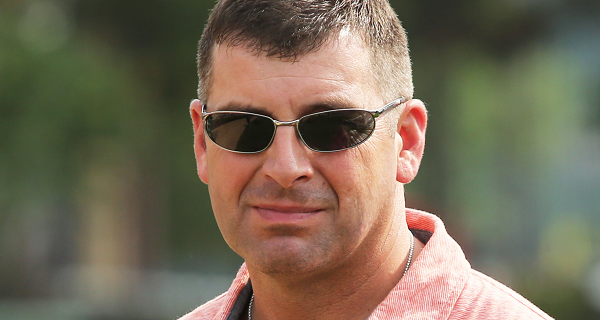BY JIM WELLS
Robertino Diodoro departed for Saratoga on Sunday to survey his stable there for a few days, leaving the barn at Canterbury Park to his assistants and crew, an assembly he routinely applauds as the most vital element of the team.
“Without them, none of this is possible,” he said. Diodoro rarely speaks about his horses without mentioning the crew, particularly as he thinks about an approaching and defining mark in his career. And the two owners, Randy Howg and Rick Wiest, farmers from Encant, Alberta, who have been with him for more than 20 years.
In the back of his mind as he prepared to leave for New York_ saying he doesn’t think about it would be a lie, he says _ was a fast approaching milestone. He left Shakopee just eight wins short of 2,000 for his career, having reached the first 1,000 four years ago at Turf Paradise in Phoenix.
“The second thousand has come a lot faster than the first,” he said. “Kind of hard to believe.”
He took a few moments before coming up with the name of winner No. 1000. “Scott Stevens rode him, at Turf Paradise,” he said. “I remember now, it was 2014 and the name of the horse was Tribal Teak.”
Diodoro has been training for 25 years. If he hadn’t gravitated to horse racing, he might have played hockey. He played the sport throughout his youth, and at the Junior A level, in Canada but seemed already inclined toward horse racing.
“I always said I was going into horses or hockey,” he recalled. “Hockey and horses seemed to be my life.” He was a goalie, but his skating ability was good enough that he could have manned a spot out front. “People always told me that I could skate well enough to not play goalie. ”
Born and raised in Calgary, Diodoro naturally grew up a Flames fan and played hockey himself from age five until he turned 21. Yet, he had been conditioned for horses and racing by his maternal grandfather, his mother Linda’s father, Jim Dorman.
“He never had more than two or three horses and my dad helped out at the barn,” Diodoro said. “He was always the first one there in the morning.”
His father, Tino, would arrive at 4:30 a.m. daily, setting the mold for what it would take if Robertino wanted to make it in the racing industry.
Diodoro’s first horse was a gift from his grandfather and the hook was set. “It took off from there. At first I couldn’t get or afford help. I was on my own,” he said.
He got his trainer’s license at age 19, and began racing at bush tracks. “I started from the very bottom up,” he said. Although he saddled winners at some of those locations, his first recognized winner was at Northlands Park in Alberta, a horse named Manchu Prince. He was 20 years old.
Training champions were recognized then for their total number of wins at the three Alberta locations: Northlands, Stampede Park and the now defunct Trout Springs. The learning curve was underway.
“The first time I was the leading trainer in Alberta,” Diodoro recalled, “I wasn’t in the top 10 for money. I had a lot of cheap horses.”
Now 44, Diodoro is operating three stables this summer, Canterbury, Evangeline Downs and Saratoga, with some 130 horses.
Champion trainer at Canterbury in 2014 and 2015, Diodoro annually rules at Turf Paradise in Phoenix, where he has won multiple training championships with dominating efforts the last five years. And he left Shakopee on Sunday with a three-win lead over Canterbury’s perennial training champ, Mac Robertson.
Diodoro was introduced to the notion of Phoenix racing when his parents returned after respites there with stories about the amiable winter climate and Turf Paradise, where he has trained for the last 12 years. Phoenix, New York, Louisiana or Minnesota it is an all encompassing daily routine.
“It completely consumes your mind,” he said. “I’m on the phone, looking up horses, buying horses. It’s constant.”
He celebrated his first 1,000 wins at Turf Paradise. He wants win no. 2,000 to come at Canterbury Park. The memories of how it started for him and the people involved seem to accompany the arrival of milestones, as they are for this one.
Frequently, he is approached by someone, or someone texts him with a message, particularly when he races in Canada “Too bad your grandfather isn’t still around to see this. He would be so proud.”
Milestones include such recollections, such connections to the past, to horses and, in many cases, to family.
Primarily, though, it’s the crew. “I always say,” Diodoro added, “that a leading trainer is really a leading team.”
The team that includes two farmers from Encant, who have stayed with him for more than two decades.
